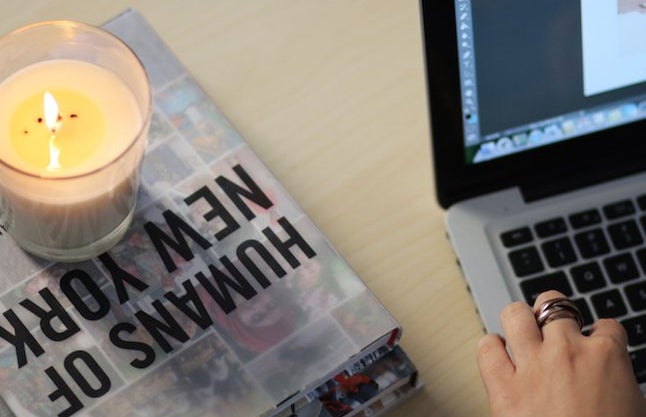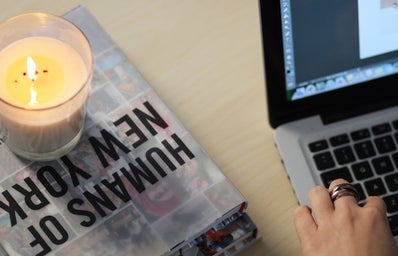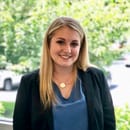Meet Dr. Keri Epps, originally from the Savannah, Georgia area! Dr. Keri Epps is an assistant teaching professor in the Writing Program at Wake Forest University. She received her undergraduate degree in English from the University of Georgia and her master’s degree in Renaissance Literature from the University of Alabama. She also graduated with her Ph.D. in Rhetoric and Composition from the University of Louisville. In her research, she investigates the different ways genre and media can be structured to allow people’s voices to be heard, particularly from marginalized communities. Beyond that, she also works in the area of community engagement to improve literacy with a focus on middle-grade education.
Her new project, Humans of Wake Forest, is inspired by the Humans of New York photoblog. Students each record a conversation with an individual on campus and transcribe a short paragraph, approximately 250 words, as well as attach a photo of the individual. Interviewees can opt to contribute anonymously. To learn more about the project and her inspiration, read the interview below.
Her Campus: What was your inspiration for this project?
Dr. Epps: When I was first conceptualizing my Writing 111 class, the “What’s Y(our) Story”, I was drawn to how sharing our vulnerabilities through writing could allow us to connect and see things from new perspectives. So, my initial reading of personal narratives online, specifically the Humans of New York series and personal stories following the 2016 presidential election, inspired me to learn more about people from both sides of the political spectrum. Given how divided we have been over the past four years, it seemed like a really good time, a kairotic moment, to think about engaging with people on a different level. In 2016, while following the Clinton campaign, I noticed a lot of interesting stories that came out of Pantsuit Nation that really resonated with me. Combined with all of these other powerful influences, they really gave shape to what I hope to achieve with the Humans of Wake Forest project.
HC: What hopes do you have for this project and where do you see this project going?
DE: My hope at the start of this project was to just bring together the community. This project was previously attempted by another class several years ago, but it never really gained much traction. So, I want to reboot this project and create something sustainable. For sustainability, I thought that including several classes and making sure to post on a consistent basis could allow this project to have a lasting impact on our community. In terms of my goals for this project right now, I want it to really just help us understand who makes up our student body and the overall campus community. Wake Forest prides itself on being a place where people can form those intimate connections with other students and faculty since it’s a small liberal arts college. However, there is a lot of disconnect. We can make some of those differences more visible through storytelling and hopefully get to understand each other a bit better. There’s work that needs to be done on campus to understand who makes up our community, not just faculty, and the student body, but also staff and anyone who contributes to how Wake Forest runs. My ultimate goal is to get this project out into the larger Winston-Salem community and be more like Humans of New York in that we would be learning stories from strangers. I think that stories have so much to offer to students who are only on campus for four years because they give you the chance to truly understand the broader community.
HC: Why do you think it’s important for people to share their stories?
DE: We often tell stories about other people. We often make up stories, more like assumptions really, about other people and what their experiences are. Therefore, I think it’s important to give people the chance to tell their own story in their own voice and not have it be told for them. For some people, they have never been asked to share their own story before. So, giving that agency and voice to someone who may have never been previously asked to share their story or has narratives that are circulating about their race, gender, or sexuality that are extremely harmful is important. Sharing the stories we gain from this project with the broader campus community can help us understand who we are. We like to say, “We are all Demon Deacons,” but we have to first build connections and trust which is not something we always do.
HC: What sort(s) of conversations do you wish for this project to engender?
DE: There are such polarizing topics that people see as only black or white even though the subject may have some nuances to it. Sometimes people forget politics are extremely personal especially in our current political climate. We always like to talk about what side of the issue we are on, but as a country, we have a hard time talking about why we are on that side. Our narrative contributes to our perspective of issues and shapes our beliefs. I hope that by doing this it will permit dialogue to take place and cause us to challenge any preconceived ideas we may have about another person’s narrative and really just question our own beliefs. I want people to talk about these “hot-button” issues and why they support something since we tend to avoid those topics.
HC: If someone will not be taking any of your courses but wishes to contribute, how should they go about doing that?
DE: First, they should email me at mathiske@wfu.edu. I am still working on a process to accept other contributions outside of those who take my course. As the project grows, the logistics of that will become more complex, but for right now anyone interested should for sure email me. I have also made contact with other professors who have courses that would align well with this project. So, I expect more classes will be involved in the future. This invitation also extends beyond just the student body and applies to anyone in the community. If they are interested, they should absolutely reach out to me.
HC: Extra question- Is there anything else you would like to share?
DE: I think I would like to reiterate that I hope this project is sustainable. In order to make that happen, it is going to take a good community of people. I am so excited about this project and know that it is a large undertaking, so I will need community cooperation to achieve my goal and make it last. My hope is that this project goes beyond the specific classes and beyond campus and that it is able to exist for many years so that it actually has an impact.



